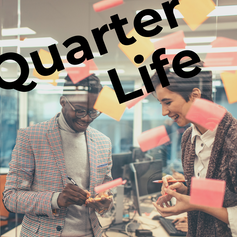
Evgeny Atamanenko/Shutterstock
Think back to a night when you slept poorly. How productive were you the next day at work? Did you struggle to get started? Did the day drag on and on? Did you procrastinate on Twitter or TikTok rather than doing your work?
If your answer to these questions is “yes”, you’re not alone. Even though we don’t fully understand why we sleep, we know that sleep is crucial for our physical and mental functioning.
So how exactly does a night of poor sleep affect our performance the next day at work, and how can we counter any negative effects?

This article is part of Quarter Life, a series about issues affecting those of us in our twenties and thirties. From the challenges of beginning a career and taking care of our mental health, to the excitement of starting a family, adopting a pet or just making friends as an adult. The articles in this series explore the questions and bring answers as we navigate this turbulent period of life.
You may be interested in:
Joy can help us be better at work – here’s how to find it
When can your boss fire you for social media use? An expert on the law explains
Managing people for the first time: expert tips on how to succeed
Research in organisational behaviour has identified sleep as important for being effective at work. For example, my colleagues and I have carried out diary studies in which employees complete surveys several times a day over several work weeks.
The findings demonstrate that on days with good as compared to bad sleep (that is, a higher sleep quality or duration) employees perform better at their core work tasks, are more engaged at work, and are more likely to support colleagues.
Meanwhile, a lack of sleep makes employees more likely to procrastinate and engage in unethical behaviour such as claiming credit for someone else’s work.
One study found that on days after managers had poorer quality sleep, their employees reported more frequent occasions of abusive supervision, such as making negative remarks about them in front of other colleagues.
Sleep affects willpower
Sleep is particularly important for higher-level cognitive skills that we use to control and coordinate our thoughts and behaviour. A vital cognitive skill that particularly relies on good sleep is self control, or willpower.
A lot of what we do at work requires willpower. We need willpower to control our impulses and emotions, to complete tasks that are less enjoyable or outright unpleasant, and to resist distractions when working.
Examples of situations that require willpower at work might include someone in a customer-facing role providing service with a smile even though they’re not really in a positive mood, or someone working remotely focusing on a challenging task while their children play in the background.

M_Agency/Shutterstock
Tips to function well after a bad night’s sleep
There’s lots of research that highlights the importance of good sleep and provides recommendations to improve sleep, such as refraining from using smartphones before bed. But from time to time, most of us will still have a bad night, especially if we’re feeling stressed. So how can we function well at work the next day?
1. Be strategic about the tasks you work on
If possible, you should avoid work tasks that require willpower on days when you haven’t slept well the night before. Instead, work on tasks that are simple and don’t require a lot of thinking or attention.
If you can’t avoid tasks that require willpower, schedule them for early in the day as that’s when you are likely to have more mental energy.
2. Rethink your mindset
Research shows that the way people think about willpower shapes their ability to engage it.
One theory suggests that exerting willpower drains our mental energy, which makes us less willing and able to exert further willpower. But people who strongly believe that willpower relies on limited mental resources feel more drained after exerting willpower compared with people who believe that willpower relies on unlimited resources that can be easily recovered.
According to my research, employees who believe that willpower relies on unlimited resources in this way perform better at work on days when they lack sleep. So, even though researchers are still working to understand the limits of willpower, you might try to reconsider your view of how strongly exerting willpower depletes your mental energy.
3. If you can’t change yourself, change your situation
If you’re on a diet, it’s easier not to buy chocolate in the supermarket in the first instance than to refrain from eating it every time you open the kitchen cupboard. Research has shown that people who are very good at exerting willpower actually try to avoid situations that will require it.
In an experiment, when given the option to work on a task in a room with few as compared to many distractions, people who were better at exerting willpower were more likely to choose the room with fewer distractions. So particularly on days where you’ve had a poor night’s sleep, strategies which avoid the need to exert willpower altogether can help you to be more productive and complete your work tasks.
4. Watch a funny video
Positive emotions can help restore our mental energy as they counteract the harmful effects of negative emotions.
In a recent study, my colleagues and I found that watching a funny video during the day can reduce the harmful mental effects of work demands that require willpower, and thereby enhance employees’ effectiveness. So on days when you didn’t sleep well you may find it helpful to briefly distract yourself by watching a funny video when you feel that your mental energy is low. But be mindful not to get hooked.
![]()
Wladislaw Rivkin does not work for, consult, own shares in or receive funding from any company or organisation that would benefit from this article, and has disclosed no relevant affiliations beyond their academic appointment.























